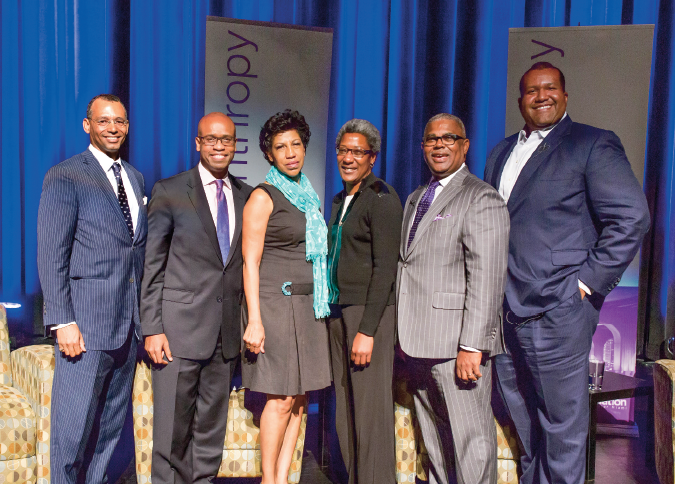MIAMI – From tragic youth gun violence to a need for increased economic opportunities, many of Miami-Dade county’s black communities are facing significant challenges. At the 2016 State of Black Philanthropy, The Miami Foundation, in partnership with the Little Haiti Cultural Complex, explored how philanthropy can address these and other pressing issues and amplify solutions. The Feb. 25 event convened 150 donors and civic leaders at the Complex for an interactive panel discussion around defining philanthropy, being more strategic with charitable investments and pooling philanthropic resources to increase impact.
The panel, led by moderator Marlon A. Hill, Esq., partner at Hamilton, Miller & Birthisel, LLP, included Jaret Davis, co-managing shareholder at Greenberg Traurig, P.A.; Bill Diggs, president, Mourning Family Foundation; Ghislain Gouraige, Jr., senior vice president, wealth management, UBS Financial Services; Charisse Grant, senior vice president for programs, The Miami Foundation; and Teri Williams, president and chief operating officer, OneUnited Bank.
“The spirit of charity has been ingrained in the black community for generations,” said Hill, also a former trustee of the Foundation. “We tithe at church; we send money to family back home and abroad; we have a long tradition giving money to those in need. The key now is to formalize and strategically steer those dollars to work on behalf of black communities across Greater Miami.”
Additional comments from the audience addressed nonprofit capacity building, specifically how organizations need to establish endowments to ensure the sustainability of their work. Discussion also noted the severely limited amount of national data
or metrics on giving in black communities.
“Despite not having the generational wealth that drives traditional philanthropy, black people give a higher percentage of their income to charitable causes,” added Grant. “This pattern of giving demonstrates that effective philanthropy is less about the dollar amount and more about using generosity to improve lives and neighborhoods in these communities.”
The Foundation, which was established in 1967, partners with individuals, families and corporations to create personalized, philanthropic funds which have resulted in the organization awarding over $230 million in grants, with $280 million in assets. At the black philanthropy discussion, the Foundation provided 10 ways attendees could “advance the state of black philanthropy,” including working with a financial advisor to designate a portion of their life insurance proceeds to benefit a nonprofit organization, talking to friends about their charitable investments to find opportunities for united giving, and telling elected officials to support nonprofits working on causes they want to see addressed.
The panelists and other local stakeholders are now working with the Foundation to develop follow-up strategies for attendees and the broader community to engage and advance philanthropic solutions for the issues discussed. For more information, visit miamifoundation.org and ourmiami.org.










No Comment